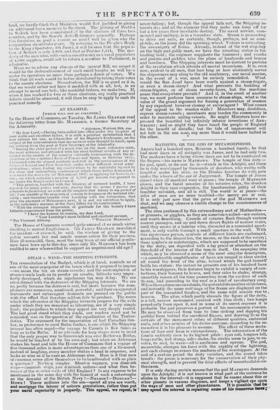AN EXAMPLE.
Ewurtn WILL NOT BE FOLLOWED.]
IN the House of Commons, on Tuesday, Sir JAMES GRAHAM read the following letter from Mr. MansDEN, a former Secretary of
the Admiralty. " Aldenham, Watford, 30th. :fan.
"My dear Lord,—Having been called into office under the auspices of your noble and excellent father, it is with a peculiar satisfaction that I now address his son, as Chancellor of his Majesty's Exchequer, on the subject of the remuneration that my services were thought to merit, upon my retiring from the post of First Secretary of the Admiralty.
" During the chief period of a naval war, on the most extensive scale, the most arduous, and attended with the most brilliant results of any re- corded in the annals of the country (virtually terminating with the de- struction of the combined fleas of France and Spain, in October 1805), I laboured with the utmost assiduity and zeal in the performance of the dtries of Second and First Secretary, under seven different naval admi ni,trations ; when, feeling my constitution to be materially injured by tile close and unremitting confinement which those duties demanded, I was under the necessity (at Mid m mmer 1807) of applying for leave to re- tire; on which occasion a pension of 1,500/. per annum was granted to me under the King's order in Council.
" This pension, together with the blessing of restored health, I have enjoyed for many years ; and now, finding that the means I possess are a 'equate to furnishing me with all the comforts that belong to my period of Jam sensible of the propriety of ceasing to trespass on the national libe- rality ; and therefore trouble your Lordship with the intimation, that after the payment of Midsummer next, it is not my intention to apply, in the customary manner, at the Navy Office for its continuance. " With the strongest impression of gratitude for the bounty I have hitherto experienced from the public, "1 have the honour to remain, my dear Lord, " Your Lordship's most faithful and obedient servant,
The House of Commons seemed quite amazed at so much virtue dwelling in mortal Englishman. Sir JAMES GRAHAM moralized the incident—it evinced, he said, the wis:lom of giving to the pubic 'servants fair and atnple remuw'ralion for their services. How ill-rewarad, then, must the long train of our official gentle- men have been up to this day, since only Mr. MARSDEN has been enabled to save wherewithal to support an unpensioned old age


























 Previous page
Previous page